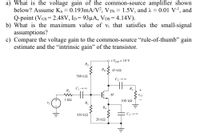
Introductory Circuit Analysis (13th Edition)
13th Edition
ISBN: 9780133923605
Author: Robert L. Boylestad
Publisher: PEARSON
expand_more
expand_more
format_list_bulleted
Question
My question is under the attachment.

Transcribed Image Text:a) What is the voltage gain of the common-source amplifier shown
below? Assume Kn = 0.193mA/V², VTN
Q-point (VGs= 2.48V, ID= 93µA, VDs = 4.14V).
b) What is the maximum value of vi that satisfies the small-signal
assumptions?
c) Compare the voltage gain to the common-source "rule-of-thumb" gain
estimate and the "intrinsic gain" of the transistor.
1.5V, and 2 = 0.01 V-l, and
=
+VDp= 10 V
%3D
R2
Rp
43 k2
560 k2
C2→ 00
R3
R1
M
vo
1 kΩ
100 k2
R|
R4
C3→ 00
430 kQ
20 k2
Expert Solution
This question has been solved!
Explore an expertly crafted, step-by-step solution for a thorough understanding of key concepts.
This is a popular solution
Trending nowThis is a popular solution!
Step by stepSolved in 3 steps with 2 images

Knowledge Booster
Learn more about
Need a deep-dive on the concept behind this application? Look no further. Learn more about this topic, electrical-engineering and related others by exploring similar questions and additional content below.Similar questions
- For the following switch circuit: A) Derive the switching algebra expression that corresponds one to one with the switch circuit. B) Derive an equivalent switch circuit with a structure consisting of a parallel connection of groups of switches connected in series. (Use 8 switches.) C) Derive an equivalent switch circuit with a structure consisting of a series connection of groups of switches connected in parallel. (Use 7 switches.)arrow_forwardB3arrow_forwardRefer to the National Electrical Code® or the working drawings when necessary. Where applicable, responses should be written in complete sentences. For problems 1 and 2, six luminaires, similar to Style E used in the Commercial Building, are to be installed in a room that is 12 ft x 18 ft (~3.7 m x ~5.5 m) with a 9 ft (2.8 m) floor-to-ceiling height. The spacing ratio for the luminaire is 1:0. 1. The maximum distance that the luminaires can be separated and achieve uniform illuminance is ft ( m). For problems 2-5, two luminaires, 8 ft (2.5 m) and 4 ft (1.2 m) in length with dimensions as shown in Figure 15-7, are to be installed in tandem (end to end). The end of the long luminaire is to be 2 ft (600 mm) from the wall. 2. The center of the outlet box should be roughed in at ft ( m) from the wall. 3. The first support should be installed at the wall. ft ( m) from 4. The second support should be installed at from the wall. ft ( m) 5. The final support should be installed at the wall. ft…arrow_forward
- Answer question clearly and fully. Make sure I can properly read out the steps. Include any and all equations used during the solving process.arrow_forwardWe are running 3 wires in an IMC to a control panel with a 150 amp circuit breaker disconnect in the control panel. The conduit is run 12 inches above the roof on a strut rack. The ambient air temperature is 88 degrees. This control panel feeds the #1 cooling fan. What sized ungrounded conductors do we need? All conductors have typeTHHN insulation. A #1 AWG B 100 Kcmil C #1/0 AWG D #10 AWG What sized IMC do we need? A 3/4" B 1 1/4" C 1" D 1 1/2"arrow_forwardHello. Attached is a practice problem I am working on. I am super confused on how to get started and not sure how to complete the problem. Could you help me through it? Thank you. I appreciate your time.arrow_forward
arrow_back_ios
arrow_forward_ios
Recommended textbooks for you
 Introductory Circuit Analysis (13th Edition)Electrical EngineeringISBN:9780133923605Author:Robert L. BoylestadPublisher:PEARSON
Introductory Circuit Analysis (13th Edition)Electrical EngineeringISBN:9780133923605Author:Robert L. BoylestadPublisher:PEARSON Delmar's Standard Textbook Of ElectricityElectrical EngineeringISBN:9781337900348Author:Stephen L. HermanPublisher:Cengage Learning
Delmar's Standard Textbook Of ElectricityElectrical EngineeringISBN:9781337900348Author:Stephen L. HermanPublisher:Cengage Learning Programmable Logic ControllersElectrical EngineeringISBN:9780073373843Author:Frank D. PetruzellaPublisher:McGraw-Hill Education
Programmable Logic ControllersElectrical EngineeringISBN:9780073373843Author:Frank D. PetruzellaPublisher:McGraw-Hill Education Fundamentals of Electric CircuitsElectrical EngineeringISBN:9780078028229Author:Charles K Alexander, Matthew SadikuPublisher:McGraw-Hill Education
Fundamentals of Electric CircuitsElectrical EngineeringISBN:9780078028229Author:Charles K Alexander, Matthew SadikuPublisher:McGraw-Hill Education Electric Circuits. (11th Edition)Electrical EngineeringISBN:9780134746968Author:James W. Nilsson, Susan RiedelPublisher:PEARSON
Electric Circuits. (11th Edition)Electrical EngineeringISBN:9780134746968Author:James W. Nilsson, Susan RiedelPublisher:PEARSON Engineering ElectromagneticsElectrical EngineeringISBN:9780078028151Author:Hayt, William H. (william Hart), Jr, BUCK, John A.Publisher:Mcgraw-hill Education,
Engineering ElectromagneticsElectrical EngineeringISBN:9780078028151Author:Hayt, William H. (william Hart), Jr, BUCK, John A.Publisher:Mcgraw-hill Education,

Introductory Circuit Analysis (13th Edition)
Electrical Engineering
ISBN:9780133923605
Author:Robert L. Boylestad
Publisher:PEARSON

Delmar's Standard Textbook Of Electricity
Electrical Engineering
ISBN:9781337900348
Author:Stephen L. Herman
Publisher:Cengage Learning

Programmable Logic Controllers
Electrical Engineering
ISBN:9780073373843
Author:Frank D. Petruzella
Publisher:McGraw-Hill Education

Fundamentals of Electric Circuits
Electrical Engineering
ISBN:9780078028229
Author:Charles K Alexander, Matthew Sadiku
Publisher:McGraw-Hill Education

Electric Circuits. (11th Edition)
Electrical Engineering
ISBN:9780134746968
Author:James W. Nilsson, Susan Riedel
Publisher:PEARSON

Engineering Electromagnetics
Electrical Engineering
ISBN:9780078028151
Author:Hayt, William H. (william Hart), Jr, BUCK, John A.
Publisher:Mcgraw-hill Education,